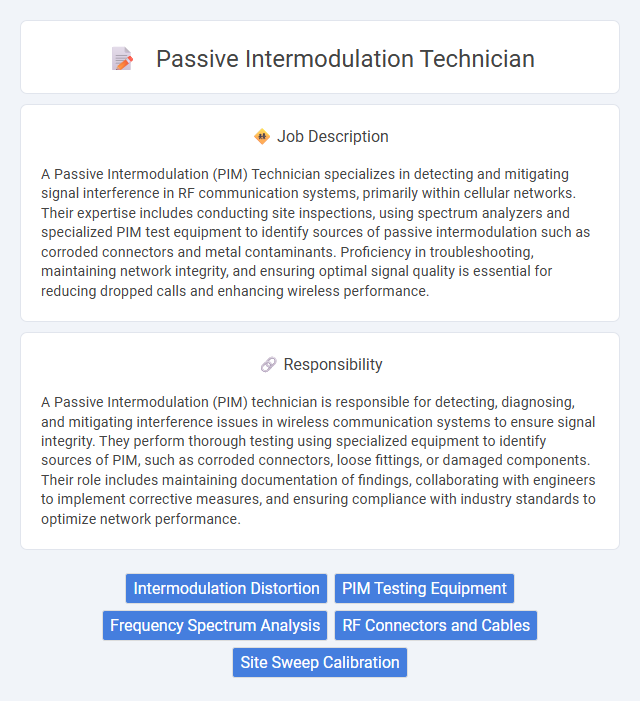
A Passive Intermodulation (PIM) Technician specializes in detecting and mitigating signal interference in RF communication systems, primarily within cellular networks. Their expertise includes conducting site inspections, using spectrum analyzers and specialized PIM test equipment to identify sources of passive intermodulation such as corroded connectors and metal contaminants. Proficiency in troubleshooting, maintaining network integrity, and ensuring optimal signal quality is essential for reducing dropped calls and enhancing wireless performance.
Individuals with strong technical skills and an analytical mindset are likely to be well-suited for a Passive Intermodulation (PIM) Technician role due to the job's demand for precise measurement and troubleshooting of radio frequency components. Those who can work independently under potentially challenging conditions, such as outdoor environments and on-site testing, may find this career to be a good fit. Physical stamina and attention to detail might also be important factors influencing suitability for this technical and hands-on position.
Qualification
A Passive Intermodulation Technician requires expertise in radio frequency (RF) systems, signal integrity, and electromagnetic interference troubleshooting. Key qualifications include a degree in electrical engineering or related fields, combined with hands-on experience in PIM testing equipment and standards such as IEC 62037. Proficiency in interpreting technical schematics, performing site surveys, and maintaining compliance with industry protocols is essential for ensuring optimal RF system performance.
Responsibility
A Passive Intermodulation (PIM) technician is responsible for detecting, diagnosing, and mitigating interference issues in wireless communication systems to ensure signal integrity. They perform thorough testing using specialized equipment to identify sources of PIM, such as corroded connectors, loose fittings, or damaged components. Their role includes maintaining documentation of findings, collaborating with engineers to implement corrective measures, and ensuring compliance with industry standards to optimize network performance.
Benefit
Passive intermodulation technician roles likely offer benefits such as competitive salaries and opportunities for specialization in telecommunications testing. Employees may experience job stability due to the growing demand for maintaining clear signal integrity in wireless networks. Benefits could also include access to advanced diagnostic tools and ongoing professional development to enhance technical skills.
Challenge
Working as a passive intermodulation technician likely involves navigating complex signal interference challenges that require precise measurement and mitigation techniques. The role probably demands strong problem-solving skills to identify and eliminate sources of passive intermodulation in communication systems. Given the technical nature of the work, technicians may frequently face evolving equipment and environmental variables that add to the difficulty of maintaining optimal signal quality.
Career Advancement
A Passive Intermodulation (PIM) technician specializes in identifying and mitigating interference in RF communication systems, a critical role in telecom infrastructure maintenance. Career advancement opportunities include progressing to roles such as RF Engineer, Project Manager, or Telecommunications Consultant, often requiring additional certifications in RF technologies and system diagnostics. Gaining expertise in cutting-edge equipment and software tools enhances job prospects and leadership potential within the wireless communication industry.
Key Terms
Intermodulation Distortion
Passive intermodulation (PIM) technicians specialize in identifying, diagnosing, and mitigating Intermodulation Distortion (IMD) in wireless communication systems. They use advanced diagnostic tools and spectrum analyzers to detect PIM levels caused by non-linearities in passive components such as connectors, cables, and antennas. Expertise in reducing IMD is critical for maintaining signal integrity and optimizing network performance in cellular and RF infrastructures.
PIM Testing Equipment
Passive Intermodulation (PIM) technicians specialize in identifying and mitigating signal interference in RF systems using advanced PIM testing equipment. These instruments utilize high-power test signals and sensitive receivers to detect and locate PIM sources in cellular towers, antennas, and cabling infrastructure. Expertise in operating PIM analyzers ensures improved network performance and reduced call drops in telecommunications environments.
Frequency Spectrum Analysis
A Passive Intermodulation (PIM) Technician specializes in identifying and mitigating interference within the frequency spectrum to ensure optimal wireless communication performance. Utilizing advanced Frequency Spectrum Analysis tools, the technician detects nonlinearities and signal distortions caused by passive components in transmission lines, antennas, and connectors. Proficiency in interpreting spectrum analyzer data is critical for diagnosing PIM sources and maintaining network integrity across broadband and cellular communication systems.
RF Connectors and Cables
A Passive Intermodulation (PIM) technician specializes in diagnosing and mitigating intermodulation interference within RF connectors and cables, ensuring optimal signal quality in wireless communication systems. Expertise in inspecting, installing, and maintaining high-quality coaxial cables and precision RF connectors is critical for minimizing PIM levels. Proficiency with advanced PIM testing equipment and knowledge of connector torque specifications contribute to reliable, interference-free RF link performance.
Site Sweep Calibration
A Passive Intermodulation (PIM) Technician specializing in Site Sweep Calibration ensures optimal performance of wireless communication systems by accurately measuring and mitigating interference on antenna sites. Utilizing calibrated test equipment, they perform site surveys to detect and eliminate PIM sources that can degrade signal quality and network reliability. Their expertise in calibration protocols and troubleshooting enhances network efficiency and supports compliance with industry standards.
 kuljobs.com
kuljobs.com